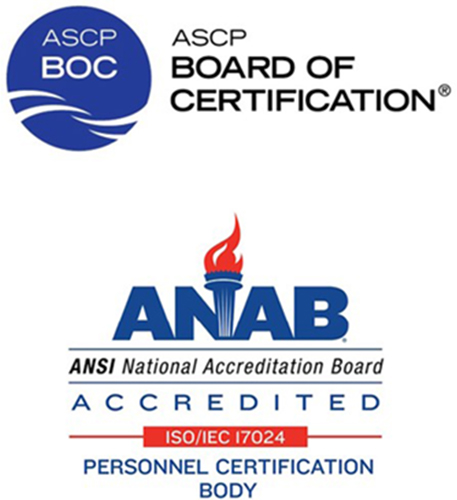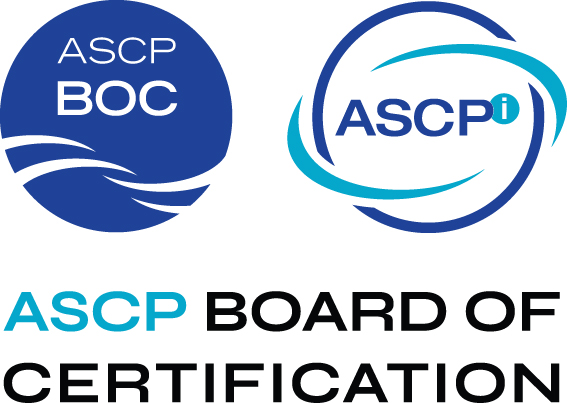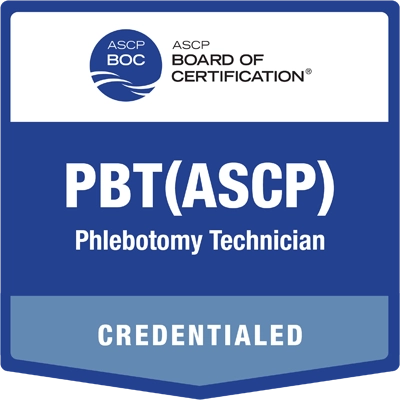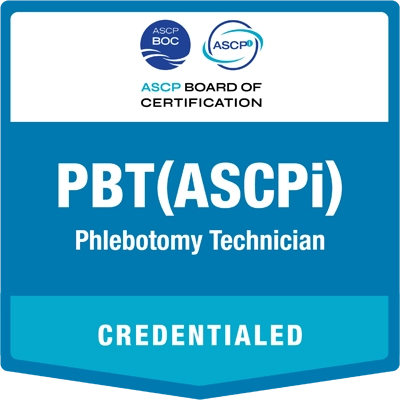Obtain certification and advance your career in phlebotomy with our specialized credential.
Works face-to-face with patients to draw blood samples. Collects, transports, and processes blood and other specimens to be analyzed in the laboratory.
Attaining an American Society for Clinical Pathology Board of Certification (ASCP BOC) credential requires a laboratory professional or other expert to meet specific education, training, and/or experience standards and to successfully pass an examination demonstrating knowledge and applied skills. The ASCP BOC offers ASCP and ASCPi credentials based on distinct eligibility requirements. All candidates must carefully compare credentialing options. Additional information is available about the similarities and differences between ASCP and ASCPi credentials.
Each credential has specific eligibility requirements, which are different for ASCP and ASCPi. It’s your responsibility to confirm that your education, training, and/or experience meet the criteria. Submit the correct documentation with your application. Once submitted, the category and route of application cannot be changed.
Check Your EligibilityAn applicant must be able to verify that they meet all eligibility requirements, including education, training, and/or experience. For complete information, see the Documentation section of the website.
Education does not need to be from the United States. Details are available by reviewing the webpage titled Acceptable Education, also available in the routes below.
To be eligible for this examination category, an applicant must satisfy the minimum requirements (for degrees, the stated degree or higher) of at least one of the following routes:
An applicant must be able to verify that they meet all eligibility requirements, including education, training, and/or experience. For complete information, see the Documentation section of the website.
Education needs to be equivalent to education from the United States. Details are available by reviewing the webpage titled Acceptable Education, also available in the routes below.
To be eligible for this examination category, an applicant must satisfy the minimum requirements (for degrees, the stated degree or higher) of at least one of the following routes:


High school graduation or equivalent,
AND successful completion of an acceptable two-part formal structured phlebotomy program within the last 5 years. This two-part program, to be arranged by the program director, must consist of:
40 clock hours of classroom training, including anatomy and physiology of the circulatory system, specimen collection (including venipuncture and skin punctures), specimen processing and handling, and laboratory operations (e.g. safety, quality control, etc.),
and clinical* training and orientation in an acceptable laboratory with a minimum performance of 100 successful unaided venipunctures that must be documented on this Structured Program Documentation Form.
Applicants should not apply until after successful completion of the structured program.
*Acceptable Clinical Laboratory:
CMS CLIA certificate of registration, compliance, accreditation;
OR DoD CLIP certificate of registration, compliance, accreditation;
OR JCI accreditation;
OR Accreditation under ISO 15189.
High school graduation or equivalent,
AND completion of 1 year of full-time acceptable clinical* experience as a phlebotomy technician in an acceptable laboratory within the last 5 years. This experience must include venipunctures and skin punctures that must be documented on this Experience Documentation Form.
Full-time experience is considered 35 hours per week.
*Acceptable Clinical Laboratory:
CMS CLIA certificate of registration, compliance, accreditation;
OR DoD CLIP certificate of registration, compliance, accreditation;
OR JCI accreditation;
OR Accreditation under ISO 15189.
High school graduation or equivalent,
AND successful completion of RN, LPN or other acceptable accredited allied health professional/occupational education which includes phlebotomy training and orientation in an acceptable laboratory* with a minimum performance of 100 successful unaided blood collections including venipunctures and skin punctures within the last 5 years that must be documented on this Training Documentation Form.
Applicants must submit a copy of their current state/provincial license for RN or LPN or copy of a certificate of completion from the accredited allied health program they completed
*Acceptable Clinical Laboratory:
CMS CLIA certificate of registration, compliance, accreditation;
OR DoD CLIP certificate of registration, compliance, accreditation;
OR JCI accreditation;
OR Accreditation under ISO 15189.
Valid DPT(ASCP) certification,
AND a minimum performance of 100 successful unaided non-donor blood collections including venipunctures and skin punctures in an acceptable laboratory* within the last 5 years that must be documented on this Experience Documentation Form.
*Acceptable Clinical Laboratory:
CMS CLIA certificate of registration, compliance, accreditation;
OR DoD CLIP certificate of registration, compliance, accreditation;
OR JCI accreditation;
OR Accreditation under ISO 15189.
High school graduation or equivalent,
AND successful completion of a phlebotomy training program approved by the California Department of Public Health within the last 5 years that must be documented on this Training Documentation Form.
AND successful completion of a formal phlebotomy program. This program must consist of:
classroom training, including anatomy and physiology of the circulatory system, specimen collection (including venipunctures and skin punctures), specimen processing and handling, and laboratory operations (e.g. safety, quality control, etc.),
and clinical# training in an accredited/approved laboratory with a minimum performance of 100 successful, unaided venipunctures that must be documented on this Training Documentation Form.
*Accredited/approved by a governing regulatory association or Ministry. Countries without a prevalent system of accreditation/approval must have programs/educational institutions approved by an International Advisory Board appointed by the ASCP Board of Certification, or eligibility will be determined by an acceptable transcript evaluation. The foreign degree must be equivalent to a U.S. degree.
#Clinical laboratory accredited by JCI, CAP, under ISO 15189 or authorized by a governing regulatory association or Ministry. Countries without a prevalent system of accreditation must have laboratories approved by an International Advisory Board appointed by the ASCP Board of Certification.
AND 1 year of acceptable clinical# experience as a phlebotomy technician in an accredited/approved laboratory. This experience must include venipunctures and skin punctures that must be documented on this Experience Documentation Form.
*Accredited/approved by a governing regulatory association or Ministry. Countries without a prevalent system of accreditation/approval must have programs/educational institutions approved by an International Advisory Board appointed by the ASCP Board of Certification, or eligibility will be determined by an acceptable transcript evaluation. The foreign degree must be equivalent to a U.S. degree.
#Clinical laboratory accredited by JCI, CAP, under ISO 15189 or authorized by a governing regulatory association or Ministry. Countries without a prevalent system of accreditation must have laboratories approved by an International Advisory Board appointed by the ASCP Board of Certification.
AND successful completion of a nursing or other acceptable biomedical science program from an accredited/approved* educational institution which includes phlebotomy training with a minimum performance of 100 successful, unaided blood collections, including venipunctures and skin punctures that must be documented on this Training Documentation Form.
*Accredited/approved by a governing regulatory association or Ministry. Countries without a prevalent system of accreditation/approval must have programs/educational institutions approved by an International Advisory Board appointed by the ASCP Board of Certification, or eligibility will be determined by an acceptable transcript evaluation. The foreign degree must be equivalent to a U.S. degree.
Applicants with training in the United States must apply through the United States PBT(ASCP) eligibility routes.
Reduced pricing is available for those educated and residing in low-to-middle income countries.
You must upload the appropriate documentation form when you apply online, verifying that you meet the training and/or experience requirements for your category and route of application. You will also need to submit an acceptable transcript or transcript evaluation verifying that you meet the academic requirements. Gather your documents before submitting your application and application fee.
Once you have confirmed that you meet the requirements and have gathered your documents, submit your online application.
 |  |
In early 2026, the ASCP BOC will launch digital badging through Credly, a trusted provider that increases the visibility of ASCP BOC credential holders by securely showcasing and sharing professional credentials. Learn more about digital badges.
